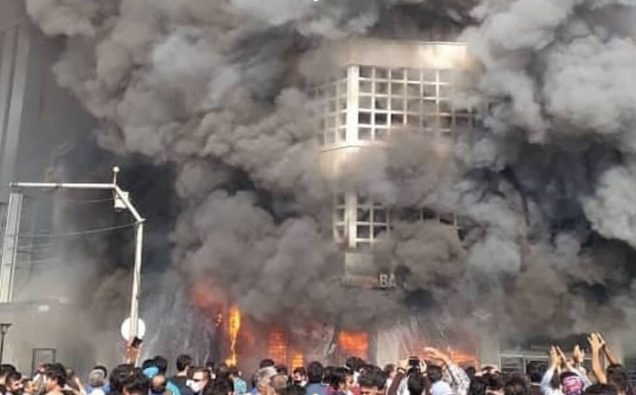
12:12 am, 2:16 am, 4:20 am, and 6:17 am. Double tapping on my phone screen to see if there are any messages from family or friends from inside Iran. There are many messages but from family and friends outside of Iran. Ever since the Internet shutdown in Iran, the web traffic has jacked up for Iranian expatriates as they want to know about the well being of their near and dear ones.
Since last week, the price of gas tripled overnight, and people started demonstration on the streets. Afraid of the reflection of the news on their brutal reaction to people’s protests, the Iranian regime shut down a large portion of the Internet across the country.
Living on this side of the global pond in the United States, hearing about negative impact of the sanctions on people and their protests adds to worries of immigrants for their place of birth. However, every time I heard about protests before, I immediately contacted family and friends, and they reassured me that they were safe but distressed.
It is incredible how we get used to using technology so quickly as if living without it is impossible. Well, it kinda is. Immigrants experience a great deal of long-distance relationships with their family and friends. Accessibility through internet connections has made the longing for them less painful.
Update: It has been 100 hours since #Iran introduced a near-total internet shutdown cutting off the country from the rest of the world 📉
Digital rights are human rights: access must be restored to all Iranians #Internet4Iran #IranProtests
📰https://t.co/1Al0DT8an1 pic.twitter.com/bojhgdbpOX
— NetBlocks.org (@netblocks) November 20, 2019
So, this time, when on Sunday afternoon, my mom told me the Internet is shut down in Iran, I immediately convinced her that it was impossible to shut down the entire Internet in any country. The banks, hospitals, universities, large and small companies are all depending on the web. The government would shut down the country if they shut down the Internet. And, every time the government limited the accessibility, people found a way to break their code. I showed her that I had received messages from friends on Saturday, and she should not relay an exaggerated message to anyone else.
On Sunday night, like before, I messaged a friend of mine through telegram, hoping to hear things are not that bad. The message didn’t go through. Using Telegram, Whatsapp, Skype, and iMessage, I messaged other friends and cousins; they were not delivered. Then I panicked. I frantically started reaching out to people in the States and reading the Farsi news, and sure enough, the government had shut down 95% of the Internet in the entire country. This was all to make it impossible for people to communicate throughout their protests. Also to make sure international journalists could not get any news from inside about the protests.
Through small channels opened by computer experts inside Iran, news started trickling out. Protests were vast in more than 100 cities across the country. A large number of protesters were out, and by Tuesday night, there was news of more than 100 people killed by the regime forces. Amnesty International also estimated the death toll to be over 100.
To my surprise, despite the widespread protests in Iran and the violent reaction of the government killing and arresting protesters, this was not among any headline news of international news channels. Persian news platforms such as BBC Persian and VOA Farsi and a few freelance journalists who received messages from inside were the sources of the news for us living abroad to follow.
Iranian women are at the forefront of #IranProtests — watch this brave Iranian woman remove her compulsory hijab on a bridge in Iran & challenge the regime directly. The internet has been shutdown since yesterday, and at least 20 people have been killed.
SHARE her voice! pic.twitter.com/bdMIUgn7nP
— Ahmed Shihab-Eldin (@ASE) November 18, 2019
Hearing the screams and bangs on the other side of the towering wall was unbearable. Not being able to communicate with loved ones in Iran, the Iranian community outside of Iran started to collaborate. Any small news received from inside the country was recycled through social media as fast as it was possible. Outside of Iran, we started expressing our immigrant feelings. Posting and sharing Persian poems on the social media once more came to soothe our hearts.
Being an immigrant is always complicated. When it comes to not being able to contact your loved ones – which is a natural thing for my generation – thee experience becomes heart-wrenching. In the era of moving towards a global village and collaboration through the World Wide Web, the minimum civil right for people in any country is access to the Internet. When that is denied from one part of the village, the rest should try to support it. Human Beings do not live in isolation. Denial of human rights in any section of the world is a direct threat to others.
Not seeing any coverage in the headline news such as CNN and BBC about the critical events in Iran and other countries such as Hong Kong, Iraq, Lebanon, and Yemen explains a lack of global support. It shows there is still a long way to go to give awareness to people for the possibility of creating a peaceful global village. Today, we need to collaborate more than ever before and support all those who need more help to share their tales.













